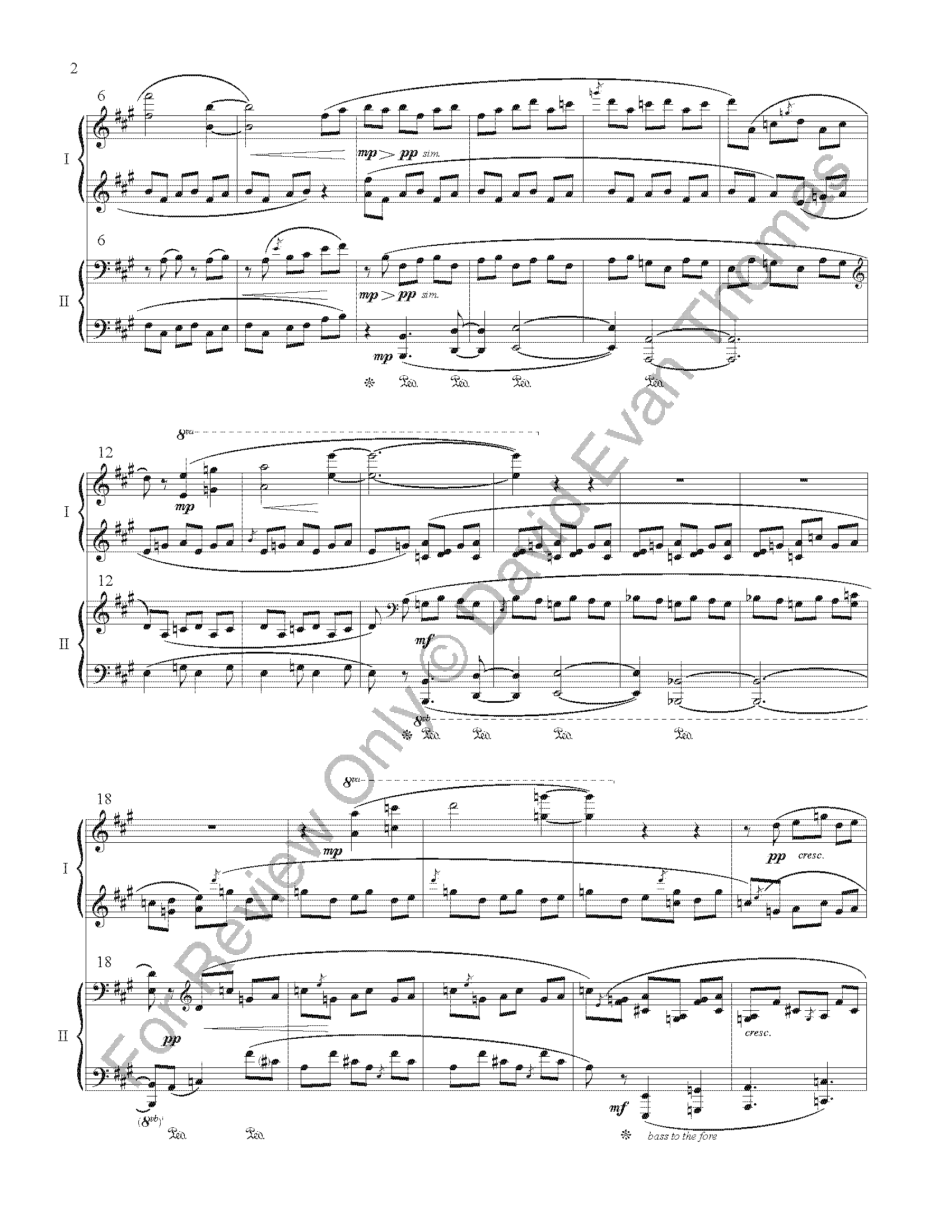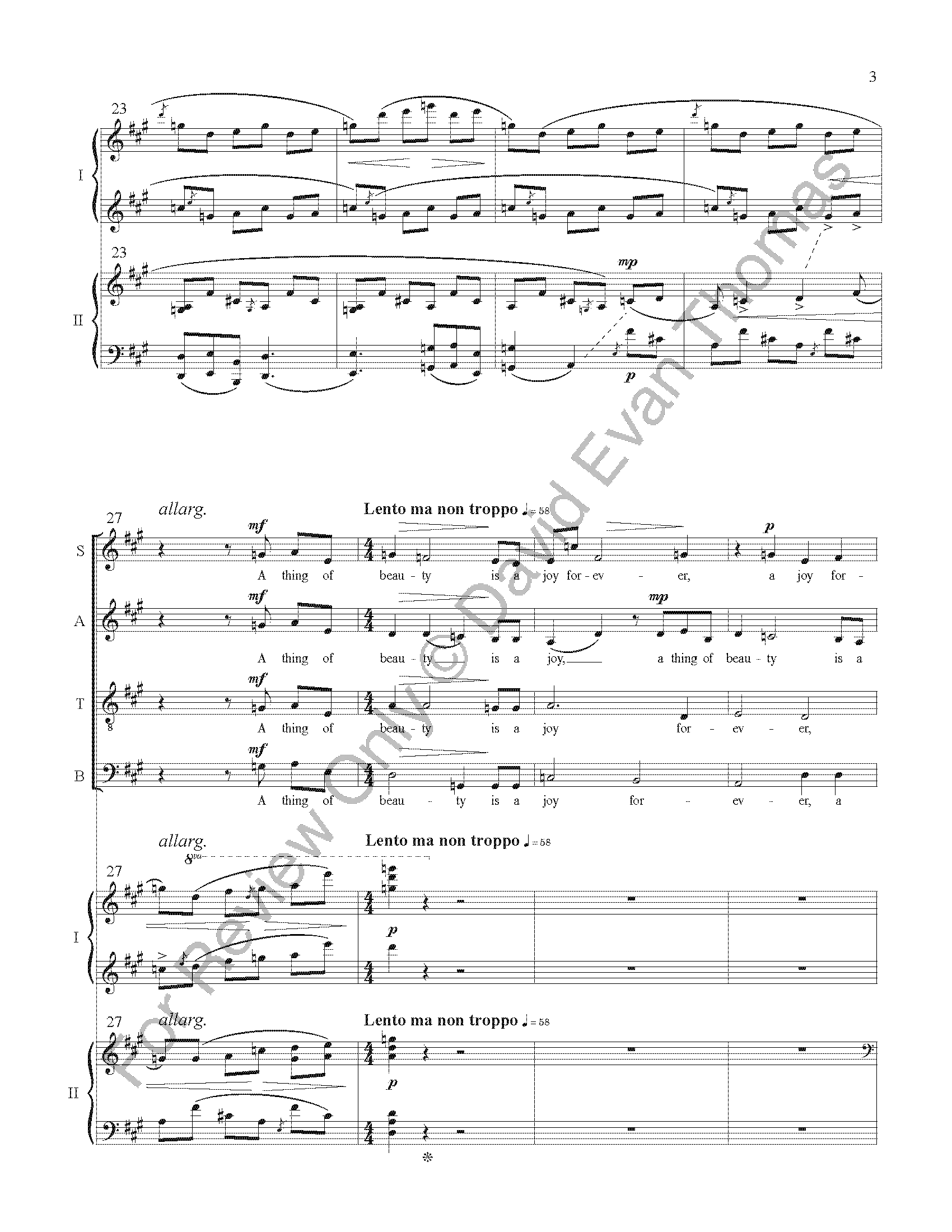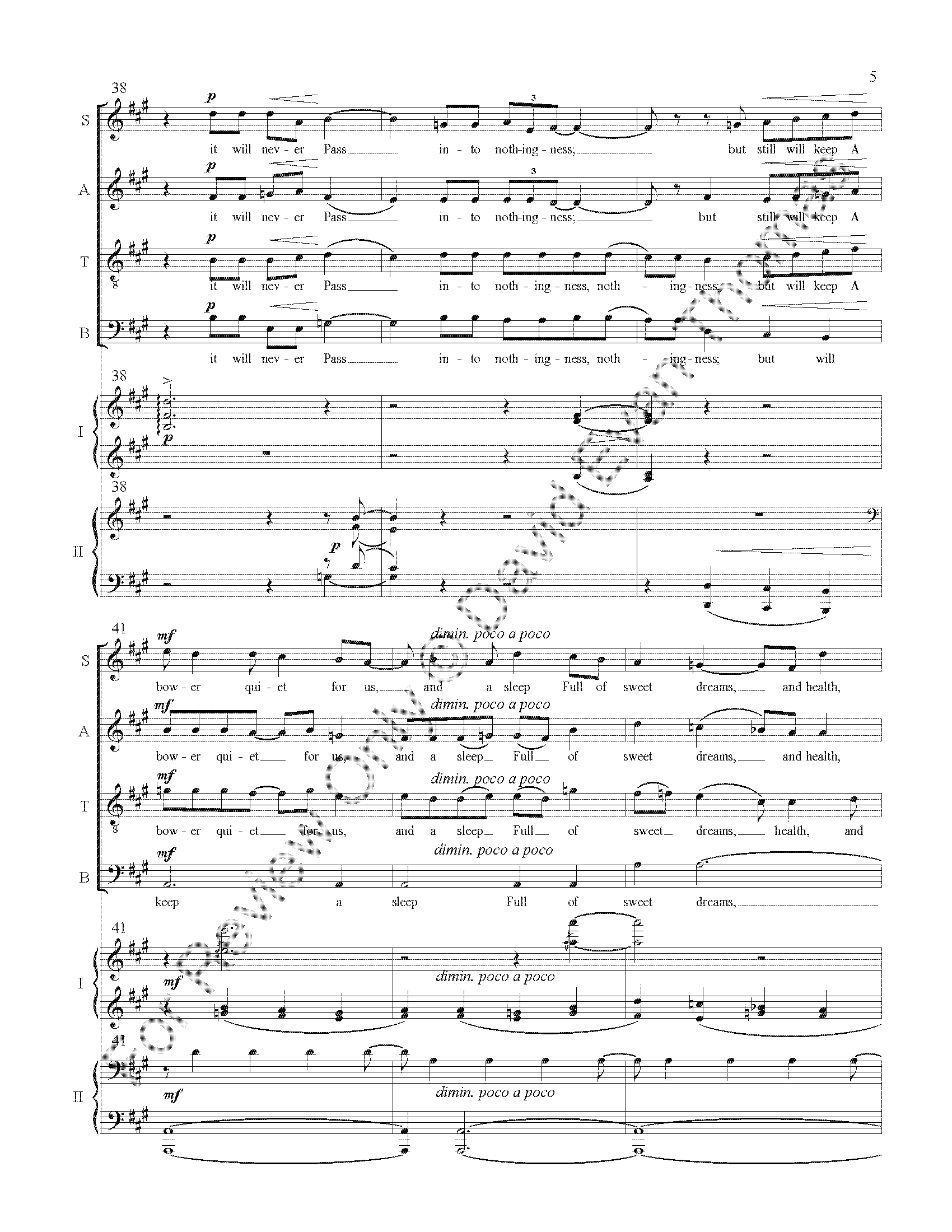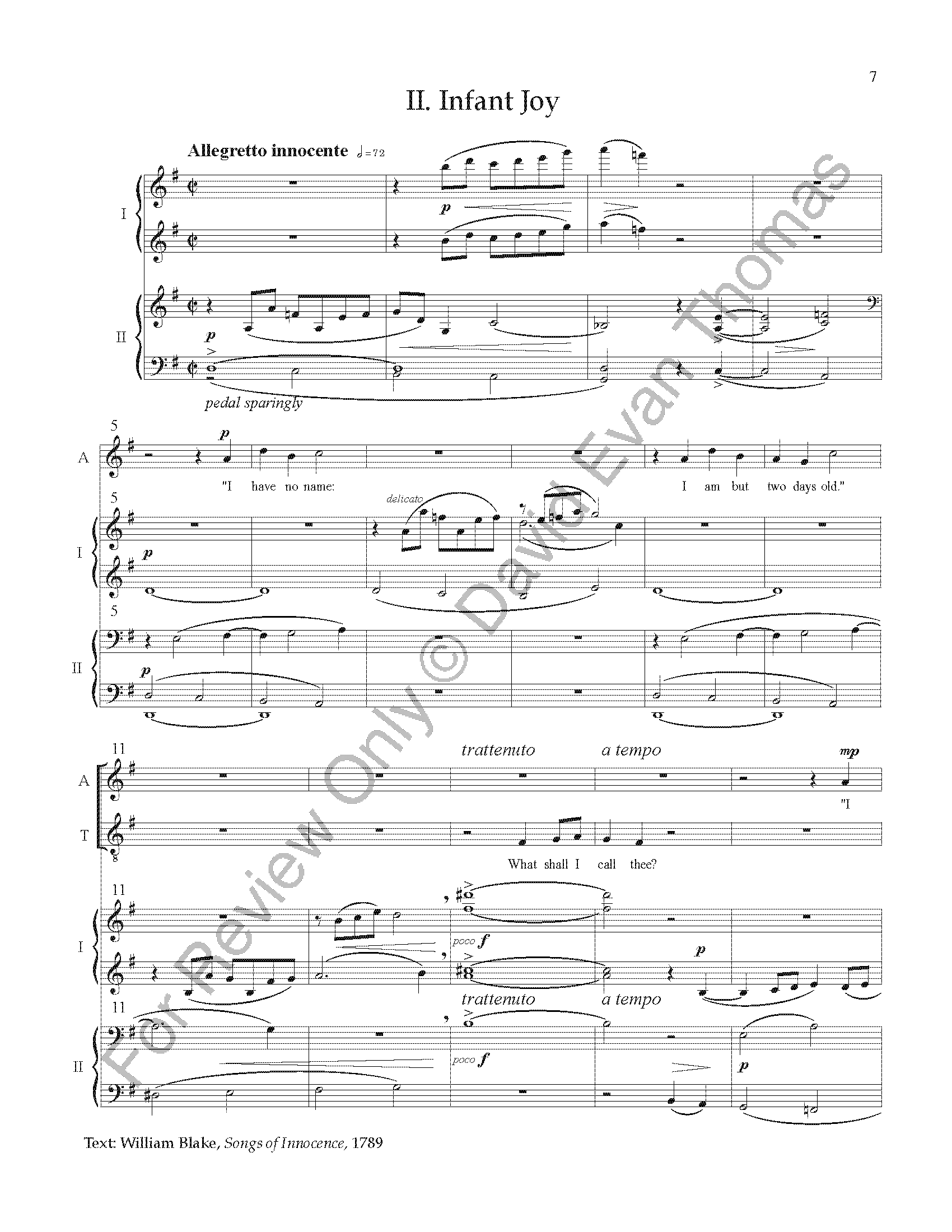David Evan Thomas: To Joy (cycle)








David Evan Thomas: To Joy (cycle)
Composer: David Evan Thomas
Poet: There are nine poets (one anonymous), two Biblical authors, excerpts from a sermon, and a dictionary entry
Voicing: SATB Soli & Piano 4-hands
Date: 2017
Duration: 44:00
About: A ramble through the world of Joy through citations from the Oxford English Dictionary, “the OED.” In the tradition of Brahms’s “Liebeslieder Walzer.” There are nine poets (one anonymous), two Biblical authors, excerpts from a sermon, and a dictionary entry.
Part 1 Recordings
Text: Part 1
3. Air
A voice by the cedar tree,
In the meadow under the Hall!
She is singing an air that is known to me,
A passionate ballad gallant and gay,
A martial song like a trumpet’s call!
Singing alone in the morning of life,
In the happy morning of life and of May,
Singing of men that in battle array,
Ready in heart and ready in hand,
March with banner and bugle and fife To the death, for their native land
. . . . .
Silence, beautiful voice!
Be still, for you only trouble the mind
With a joy in which I cannot rejoice,
A glory I shall not find.
Alfred, Lord Tennyson (1809–1892), Maud, v. iii, 1855
4. Ode
She dwells with Beauty—Beauty that must die;
And Joy, whose hand is ever at his lips
Bidding adieu; and aching Pleasure nigh,
Turning to poison while the bee-mouth sips:
Ay, in the very temple of Delight
Veil'd Melancholy has her sovran shrine,
Though seen of none save him whose strenuous tongue
Can burst Joy's grape against his palate fine;
His soul shalt taste the sadness of her might,
And be among her cloudy trophies hung.
Keats, “Ode on Melancholy,” 1820
I. Promise
A thing of beauty is a joy forever:
Its loveliness increases; it will never
Pass into nothingness; but still will keep
A bower quiet for us, and a sleep
Full of sweet dreams, and health, and quiet breathing.
John Keats (1795– 1821), Endymion, 1818
1. Infant Joy “
I have no name:
I am but two days old.”
What shall I call thee?
“I happy am, Joy is my name.”
Sweet joy befall thee
Pretty joy!
Sweet joy, but two days old.
Sweet joy I call thee:
Thou dost smile,
I sing the while,
Sweet joy befall thee!
William Blake (1757–1827), Songs of Innocence, 1789
2. Grace
Consider it
(This outer world we tread on) as a harp,—
A gracious instrument on whose fair strings
We learn those airs we shall be set to play
When mortal hours are ended. Let the wings,
Man, of thy spirit move on it as wind,
And draw forth melody.
Let thy praise
Go up as birds go up that, when they wake,
Shake off the dew and soar.
So take Joy home,
And make a place in thy great heart for her,
And give her time to grow, and cherish her;
Then will she come, and oft will sing to thee,
When thou art working in the furrows; ay,
Or weeding in the sacred hour of dawn.
It is a comely fashion to be glad,—
Joy is the grace we say to God.
Jean Ingelow (1820–1897), “Dominion”
Text: Part 2
5. Alarm
Cara! Cara! silence all that train:
Joy to great Chaos! let Division reign:
Chromatic tortures soon shall drive them hence, [55]
Break all their nerves, and fritter all their sense:
One Trill shall harmonize joy, grief, and rage,
Wake the dull Church, and lull the ranting Stage;
To the same notes thy sons shall hum, or snore,
And all thy yawning daughters cry, encore. [60]
Alexander Pope (1688–1744), Dunciad, 1742
6. Question
Who is this that darkeneth counsel by words without knowledge?
Where wast thou when I laid the foundations of the earth?
Who hath laid the measures thereof.
Who hath stretched the line upon it?
Whereupon are the foundations thereof fastened?
Who laid the corner stone thereof;
When the morning stars sang together, and all the sons of God shouted for joy?
Job 38: 2, 4–7, KJV
7. Scherzetto
Gioia,
a joy, a gemme, a jewell,
or any precious thing.
Also jouissance, delight,
hearts-safe or comfort
John Florio (1553–1625), Queen Anna's New World of Words, 1611
In which Christ was born. Hurrah.
A Father begotten
I came Redeemer of nations
recognize every age,
Word from above. Refrain
From the rising
Adam parent that abused them
Mary pregnant belly
A partner in his father's eye.
Light Blessed Trinity,
Glory to Thee, O Lord.
15th-century English
8. Carol
Make we joy now in this fest
In quo Christus natus est. Eya.
A Patre Unigenitus
Is through a maiden come to us:
Sing we of Him and say Welcome,
Veni, Redemptor gencium. Refrain
Agnoscat omne seculum,
A bright star made three kings come,
Him for to seek with their presen's,
Verbum supernum prodiens. Refrain
A solis ortus cardine
So mighty a Lord is None as He;
And to our kind He hath Him knit,
Adam parens quod polluit. Refrain
Maria ventre concepit,
The Holy Ghost was ay her with,
Of her in Bethlem born He is,
Consors paterni luminis. Refrain
O lux beata Trinitas,
He lay between an ox and ass,
Beside His mother maiden free,
Gloria tibi, Domine. Refrain
15th-century English
Text: Part 3
9. Song
With lifted feet, hands still,
I am poised, and down the hill
Dart, with heedful mind;
The air goes by in a wind.
Swifter and yet more swift,
Till the heart with a mighty lift
Makes the lungs laugh, the throat cry:—
“O bird, see; see, bird, I fly.
“Is this, is this your joy?
O bird, then I, though a boy,
For a golden moment share
Your feathery life in air!”
Say, heart, is there aught like this
In a world that is full of bliss? ‘
Tis more than skating, bound
Steel-shod to the level ground.
Speed slackens now,
I float Awhile in my airy boat;
Till, when the wheels scarce crawl,
My feet to the treadles fall.
Alas, that the longest hill
Must end in a vale; but still,
Who climbs with toil, wheresoe’er,
Shall find wings waiting there.
–Henry Charles Beeching (1859–1919), “A Boy’s Song,” 1895
11. Pæan
How beautiful upon the mountains are the feet of him that bringeth good tidings, that publisheth peace, that publisheth salvation; that saith unto Zion, Thy God reigneth!
Break forth into joy, sing together, ye waste places of Jerusalem: for the LORD hath comforted his people, he hath redeemed
Jerusalem. Isaiah. lii. 9 KJV, 1611
12. Responsory
Rejoice in the Lord, and again, I say rejoice…
Have you rejoiced all day in feasts, in musics, in conversations? Well, at night you must be alone, hand to hand with God.
Sleep not till you have tried whether you joy will hold out there too.
Rejoice in the Lord …
Have you rejoiced in the contemplation of those temporal blessings which God hath given you? ‘tis well, for you may do so:
Rejoice in the Lord …
See whether you can rejoice again in such a use of those blessings, as he that gave them requires of you.
Rejoice in the Lord …
Have you rejoiced in your zeal of God’s service? That’s a true rejoicing in the Lord;
But again I say rejoice…
See that this joy be accompanied with another joy; that you have zeal with knowledge.
Rejoice in the Lord …
Refine your joy, purge away all dross and lees from your joy,
Joy, which when it is true, and truly placed, is the nearest representation of heaven itself to this world.
John Donne (1573–1631), Sermon XCVII, Preached at Lincoln’s Inn, 1621
13. Hymn
When the darkness melts away
at the breaking of the day,
bid us hail the cheering ray:
light for evermore.
When for vanished days we yearn,
Days that never can return,
Teach us in Thy love to learn
Love for evermore.
When the breath of life is flown,
when the grace must claim its own,
Lord of life, be ours thy crown,
life for evermore.
When the heart by sorrow tried,
feels at length its throbs subside,
bring us, where all tears are dried,
joy for evermore.
John Ellerton (1826-1893) “Things Eternal” in Hymns (1888)
14. Envoy
Joy, joy forever! my task is done—
The gates are passed, and heaven is won!
Farewell, ye odors of earth, that die
Passing away like a lover’s sigh:
My feast is now of the Tooba Tree,
Whose scent is the breath of Eternity!
Joy, joy forever! my task is done—
The gates are passed, and heaven is won!”
Thomas Moore (1779–1852), Lalla Rookh, 1817
Source Notes
“To Joy: Citations from the OED” was commissioned by Nell Slater for Source Song Festival. It was premiered on August 7, 2017 at Sundin Music Hall in St. Paul, MN by Mary Wilson, soprano, Clara Osowski, mezzo-soprano, Jacob Christopher, tenor, Tyler Duncan, baritone with Erika Switzer & Arlene Shrut, piano.
Composer Info
The music of David Evan Thomas has been praised for its eloquence, power and craft. A recipient of two McKnight Foundation Artist Fellowships, an Award in Music from the American Academy of Arts and Letters, and the Möller-A.G.O. Award in Choral Composition, Thomas has received commissions from the Minnesota Orchestra, the Saint Paul Chamber Orchestra, the American Composers Forum and the American Guild of Organists. His music is published by ECS, MorningStar, Augsburg Fortress, Jeanné, and Classical Vocal Reprints and VocalEssence Press.
David Evan Thomas was the first composer-in-residence for the Schubert Club, which awarded him the An die Musik Award for outstanding service in 2016, and he served Westminster Presbyterian Church (Minneapolis) and the Cathedral of Saint Paul through a FaithPartners residency. Other residencies have taken him to Wyoming—the Ucross and Brush Creek Arts Foundations—and to California’s Villa Montalvo.
Recent honors include the VocalEssence Welcome Christmas Carol Contest and the Renée B. Fisher Composer Awards. In 2018, Thomas was initiated into Sigma Alpha Iota Fraternity as a National Arts Associate.
Born in Rochester, New York in 1958, David Evan Thomas received degrees from Northwestern University, Eastman School of Music and the University of Minnesota. His teachers included Dominick Argento, Samuel Adler and Alan Stout, with further study at the Aspen Festival and with David Diamond at the Atlantic Center for the Arts.
Thomas lives in Minneapolis, where he is also active as a program annotator for the Schubert Club, a choral singer and pianist. More: www.davidevanthomas.com.
Poet Info
The Oxford English Dictionary, affectionately called “the OED” by its devotees, is the standard reference for anyone interested in the English language, its shades of meaning, and its evolution over time. The model for a miscellany for SATB with piano four-hands is naturally the Liebeslieder of Brahms. In creating my set of “joyous lieder,” I surveyed the OED’s capacious entry on Joy, first published in 1901, and followed the clues of the various citations to their respective sources. I frequently found that widening the focus yielded a more interesting text. I chose fourteen that range over five centuries. There are eight named poets, one anonymous poet, two Biblical authors, a dictionary entry, and excerpts from a sermon. Eight of the texts are secular, six sacred.
